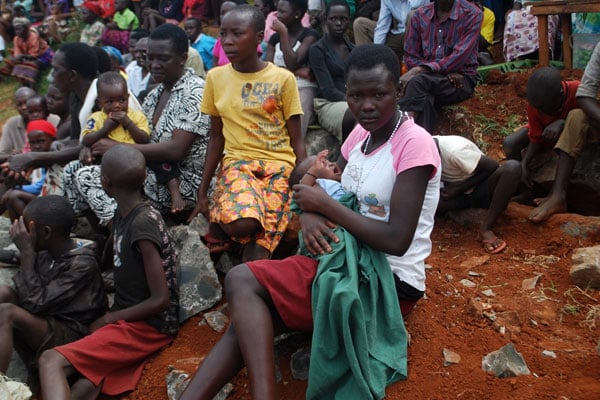Rights activists call for universal protection of women

Teenage mothers attend a sensitisation meeting against underage marriages and gender-based violence in Kapchorwa District recently. PHOTO BY FRED WAMBEDE
What you need to know:
Ms Latifah Luzinda, the Coordinator of the Uganda Harm Reduction Network (UHRN)'s dropping centers, Ms Latifah Luzinda said on Wednesday that all women including those who are addicted to drugs must be protected against all forms of violence.
Women's rights activists have demanded for universal protection of women’s rights.
Ms Latifah Luzinda, the Coordinator of the Uganda Harm Reduction Network (UHRN)'s dropping centers, said on Wednesday that all women, including those who are addicted to drugs must be protected against all forms of violence.
The United Nations defines violence against women as any act that results in or is likely to result in sexual, physical, or mental harm or suffering to women, including threats of such acts.
"The way everyone is very active when it comes to defending the rights of women from the general population should be the same way with the women who use drugs because they equally suffer all forms of violence," she said.
Ms Luzinda said society has been a little bit cruel to them, something that she said deters such women from seeking the much-needed services being accessed by other victims of violence, including access to treatment and justice.
She said the majority of women who use drugs are often at a greater risk of sexual, physical, and psychological violence.
According to the United Nations Office on Drugs and Crime, about 1 in 3 women worldwide have experienced sexual and other forms of violence.
The Uganda Police Force crime reports have for the last four years indicated that over 200 women are killed in gender-based violence annually.
In addition, the Ministry of Health statistics indicate that five of 15 people who, on average, check into Butabika National Referral Mental Hospital’s alcohol and drug unit each month, grapple with some form of opioid addiction.
Ms Luzinda also revealed that on a daily basis, each of their dropping centres in Kampala, Masaka, and Luwero receives three to five women drug addicts on a daily basis.
"In a day, we can receive three to five. Before the anti- narcotics Bill came into existence, we could see about five to 10 women walk into our centres seeking services. They come and freshen up, take a nap from the centres but we extend health services to where they live in the community," she said.
Some of the services include counselling, screening, and treating sexually transmitted infections (STIs) and cervical cancer among others.
A study undertaken by Makerere University indicates that HIV prevalence among people who inject drugs stands at 17 percent, which is much higher than the national prevalence of about 5 percent.
Commenting on the theme for this year's 16 Days of Activism against Gender-based Violence, "Unit, invest to prevent violence against women and girls", Ms Luzinda said the theme was timely since most of the people working towards ending the vice are struggling financially.
“They are doing it out of goodwill. I believe there is much that they would have loved to do but, we have limited funding for such interventions. It is something that has attracted the attention of government and donors but a lot is still needed in funding these activities," she said.
Every year. Uganda joins the rest of the world to commemorate 16 Days of activism against gender-based violence from November 25 to December 10, (Human Rights Day).
According to UN Women, women around the world face stigma associated with drug use compared to their male counterparts.
This they say is compounded by the existing gender inequalities and stereotypes that are more pronounced in patriarchal society.
The UN Women also states that in some countries, women who are addicted to drugs are subjected to coerced sterilization while others lose custody of their children.
Ms Luzinda said ending violence against women is possible but, it requires increased awareness and the involvement of all stakeholders.
“We might be the foot soldiers but we need backup from law enforcement officers, religious leaders, and the general public among other stakeholders," she said.
Mr Dan Katende, UHRN’s Research and Documentation Officer said that since the majority of the perpetrators of violence against women are men, they (men) too should take the lead in the fight against the vice.



